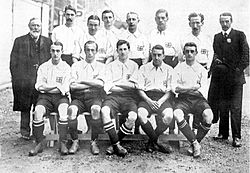Great Britain Olympic football team facts for kids
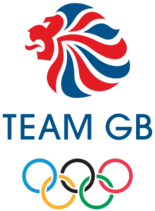 |
||||||||||||||
| Nickname(s) | Team GB | |||||||||||||
|---|---|---|---|---|---|---|---|---|---|---|---|---|---|---|
| Association | The Football Association (since 1907) | |||||||||||||
| Most caps | Jim Lewis Mike Pinner (11) |
|||||||||||||
| Top scorer | Will Campbell (10) | |||||||||||||
| FIFA code | GBR | |||||||||||||
|
||||||||||||||
| First international | ||||||||||||||
(London, Great Britain; 20 October 1908) |
||||||||||||||
| Biggest win | ||||||||||||||
(London, Great Britain; 20 October 1908) |
||||||||||||||
| Biggest defeat | ||||||||||||||
(Melbourne, Australia; 30 November 1956) (Sofia, Bulgaria; 5 May 1971) |
||||||||||||||
| Olympic Games | ||||||||||||||
| Appearances | 8 (first in 1900) | |||||||||||||
| Best result | Gold: 1900,1908, 1912 | |||||||||||||
|
Medal record
|
||||||||||||||
The Great Britain Olympic football team is a men's football team. It represents the United Kingdom at the Summer Olympic Games. The team is known as Team GB at the Olympics.
The Football Association (FA) organizes the team. This team only plays in the Olympic Games. For other big football tournaments, the different parts of the UK – England, Scotland, Wales, and Northern Ireland – have their own national teams. This has been the case for a very long time.
The team first played in the 1908 Summer Olympics in London. This was the first time the Olympics had official football teams chosen from national players. Before that, in 1900 and 1904, club teams played instead. Great Britain won gold medals in 1908 and 1912.
After a break, the team played again in the 1936 Games. Players from all parts of the UK were included. The team then competed in every Olympics from 1948 until 1972. Their best result in this period was fourth place in 1948.
The FA stopped entering a team after 1974. This was because rules about amateur and professional players changed. For the 1992 Games, professional players under 23 were allowed, plus three older players. Even with this change, Great Britain did not enter a team until London hosted the 2012 Games.
A women's team also played in the 2012 and 2020 Games. Women's football was added to the Olympics in 1996.
Team History
How the Team Started
The Football Association (FA) was created in London in 1863. Thirteen teams met to create shared rules for football. This helped clubs play against each other more easily. At that time, international football was not common.
The first matches between national teams were set up by the FA. They invited English and Scottish players to form teams. Later, the Scottish Football Association (SFA) was formed in Scotland in 1873. The Football Association of Wales (FAW) started in 1876, and the Irish Football Association (IFA) in 1880.
So, football matches between the four parts of the UK (called the Home Nations) began before other countries had their own football groups. A single "United Kingdom football association" was never formed. When football was first included in the 1900 Olympic Games, many countries didn't have national teams ready. So, club teams played instead. Upton Park represented the UK and won the gold medal.
Early Olympic Success (1908–1936)
For the 1908 Olympic Games in London, the FA helped make football an official tournament. A team of only English players was entered. This team competed as "United Kingdom" and won all three of its matches. They beat Sweden and Netherlands. In the final, they defeated Denmark 2–0.
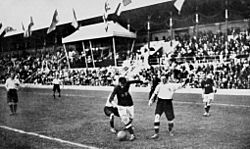
The team won again at the 1912 Games. They won all three matches and beat Denmark 4–2 in the final.
At the 1920 Summer Games, Great Britain lost in the first round to Norway. Britain only used amateur players, while other nations used their best players. This caused problems between the FA and FIFA. The FA wanted the Olympics to be only for amateur players. FIFA wanted a full world championship. This led to the FA leaving FIFA for a while. They also didn't enter the 1924 and 1928 Olympic football tournaments.
Eventually, they agreed that Olympic football would be for amateur players only. The FIFA World Cup was created for all players, both professional and amateur. Great Britain returned to Olympic football at the 1936 Summer Olympics. They lost 5–4 to Poland in the quarter-finals.
Post-War Years (1948–1972)
After World War II, Great Britain played in all Olympic football tournaments from 1948 to 1972. The 1948 tournament was held in London and was the team's most successful.
By this time, Britain's amateur players were not as strong as they used to be. This was because professional football had grown a lot. But in other countries, where professional leagues were not as developed, teams could field their strongest players. The manager, Matt Busby, led a team with players from all the Home Nations. Britain reached the semi-finals. They lost to Yugoslavia and then to Denmark, missing out on a bronze medal.
After 1948, Great Britain did not perform as well. They were knocked out early in 1952 and 1956. Their last appearance at an Olympic Games was in 1960. The team was again chosen from all the Home Nations. They were eliminated in the first round. After 1960, Great Britain failed to qualify for the next three Olympics. Their last qualifying match was a 5–0 loss to Bulgaria in 1971.
In 1974, the Football Association stopped separating professional and amateur players. All players were simply called 'players'. This meant the end of the amateur England team, which had been the basis for the British Olympic team. So, the FA stopped entering a football team in the Olympics.
Absence from the Tournament (1976–2008)
For the 1984 Summer Olympics, professional footballers were allowed to play for the first time. Later, from the 1992 Summer Olympics, teams could use players under 23 years old. They could also have three older players in the squad.
Even with these changes, Great Britain did not enter a team for many years. The UEFA European Under-21 Championship became the way for European nations to qualify. On four occasions, teams from Great Britain (England or Scotland) finished in qualifying spots, but a combined team was not sent.
The British Olympic Association wanted to enter a team for the 2008 Summer Olympics. England's Under-21 team had qualified. However, a team was not entered because the other three Home Nations did not agree.
Return for London 2012
|
|
| The BOA released a supporters' shirt for fans of Team GB |
Because London won the right to host the 2012 Games, the United Kingdom could enter a team as the host nation. The British Olympic Association (BOA) wanted to enter a football team. However, the Scottish, Welsh, and Northern Irish football associations were worried. They feared that playing as Great Britain might make them lose their special independent status in football.
Many people, including fans and politicians, shared their opinions. FIFA President Sepp Blatter first said that playing as one team for the Olympics would not affect the Home Nations' status. But later, he seemed to change his mind. He suggested that only a team of English players should enter.
A solution was finally found. A squad made up only of English players would represent the United Kingdom. However, the BOA wanted to pick players from all four countries. They said it would be unfair to only pick English players. It was then confirmed that the FA would select players from outside England too. Players like Gareth Bale and Aaron Ramsey from Wales wanted to play.
Getting Ready for the Tournament
In October 2011, Stuart Pearce was announced as the manager. He made a list of players he wanted to consider. Players who didn't want to be included could say so. It was decided that players chosen for the UEFA Euro 2012 England squad would not be picked for the Olympics. This was to avoid players getting too tired.
In January 2012, it was shared that 191 players were contacted, and 7 said no. The list was cut to about 80 players in April 2012. The final squad of 35 players was given to FIFA in early June.
Great Britain was placed in Group A for the Olympic tournament. The draw on April 24, 2012, added Uruguay, United Arab Emirates, and Senegal to their group. The final 18-man squad was announced on July 2, 2012.
The Olympic Tournament
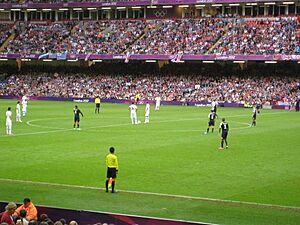
Great Britain's first match was a 1–1 draw with Senegal on July 26. Craig Bellamy scored for Great Britain. Their second match was a 3–1 win against the United Arab Emirates. Ryan Giggs, Scott Sinclair, and Daniel Sturridge scored. Sturridge scored again in the 1–0 win against Uruguay in their last group game.
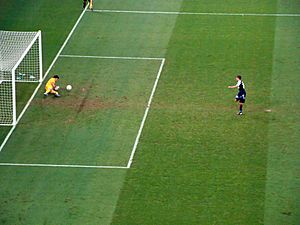
In the knockout stage, Great Britain played South Korea in the quarter-finals. The score was 1–1 after extra time. The match went to a penalty shoot-out. Great Britain lost 4–5 after Sturridge missed his shot.
Future of the Team (2016–Present)
After the 2012 Olympics, there were no public plans to bring the men's team back for future Games. The FA said they would not support a future men's team. The main problem is that the individual Home Nations compete in the qualifying tournaments, so there's no clear way for a Great Britain team to qualify.
In 2015, the FA changed its view. They thought the Olympic tournament was good for young players. They told the other Home Nations they wanted to enter teams in 2016 if England qualified. But the Scottish, Welsh, and Northern Irish associations were still against it. They feared losing their independent status. So, the FA decided not to enter teams for 2016.
After Team GB didn't play in the 2016 Olympics, talks started again for the 2020 Tokyo Olympics. FIFA approved the idea of a Great Britain team for 2020. But the Welsh, Scottish, and Northern Irish FAs still had concerns. However, the FA chief executive, Martin Glenn, said that FIFA had confirmed their independent status would not be affected.
An agreement was reached for a women's team to play in the 2020 Summer Olympics. This depended on England's performance in the 2019 World Cup. But this agreement did not include the men's team.
After the Tokyo 2020 Olympics, there were hopes for a men's team at Paris 2024. However, this did not happen. England's Under-21 team did finish in a qualifying spot for 2024.
As of mid-2025, discussions have restarted about bringing the Great Britain men's team back for Los Angeles 2028. However, the chief of the Football Association of Wales said that no talks had begun and their focus was on Wales playing in tournaments.
Team Colors
The official uniform for the 2012 Olympics was designed by Stella McCartney. It was made by Adidas. The front of the shirt looked like the union flag, with white and different shades of blue. The back of the shirt, shorts, and socks were navy blue with red trim. The away kit was light blue and white. The team's badge was on the left side of the shirt. It had the Team GB logo in blue with "London 2012" below it.
Players
Team Makeup
The players on the team have changed over time. In 1908, 1912, 1920, and 1956, all players were English. In other years, players from Northern Ireland, Scotland, and Wales were also included. The 2012 squad had 13 English and 5 Welsh players. There were no Scottish or Northern Irish players.
Jack Butland was the only player chosen for both the Olympics and the England UEFA Euro 2012 squad. Ryan Giggs, Craig Bellamy, and Micah Richards were the three older players allowed in the squad. Famous former England captain David Beckham was considered but not chosen for the final squad.
London 2012 Squad
The Great Britain squad for the 2012 Olympic Games was announced on July 2, 2012. Ryan Giggs was named captain.
- The three over-age players are marked with a *
- Clubs listed are where the player was registered during the Olympics
- Players' ages are how old they were on the day of their first game at the Olympics
| No. | Pos. | Player | Date of birth (age) | Caps | Goals | Club | ||
|---|---|---|---|---|---|---|---|---|
| 1 | GK | 19 | 5 | 0 | ||||
| 18 | GK | 21 | 1 | 0 | ||||
| 2 | DF | 23 | 5 | 0 | ||||
| 3 | DF | 22 | 4 | 0 | ||||
| 5 | DF | 20 | 5 | 0 | ||||
| 6 | DF | 22 | 3 | 0 | ||||
| 12 | DF | 23 | 2 | 0 | ||||
| 14 | DF | 24 | 5 | 0 | ||||
| 4 | MF | 22 | 4 | 0 | ||||
| 7 | MF | 22 | 5 | 0 | ||||
| 8 | MF | 22 | 5 | 0 | ||||
| 11 | MF | 38 | 4 | 1 | ||||
| 13 | MF | 23 | 4 | 0 | ||||
| 15 | MF | 21 | 5 | 1 | ||||
| 16 | MF | 23 | 4 | 1 | ||||
| 9 | FW | 22 | 5 | 2 | ||||
| 10 | FW | 33 | 5 | 1 | ||||
| 17 | FW | 21 | 3 | 0 | ||||
Records and Statistics
Olympic Games Performance
Gold medalists
Silver medalists
Bronze medalists
| Summer Olympics | Qualification | Manager | |||||||||||||||||
|---|---|---|---|---|---|---|---|---|---|---|---|---|---|---|---|---|---|---|---|
| Year | Host | Round | Pld | W | D | L | F | A | Squad | Pos. | Pld | W | D | L | F | A | |||
| 1900 | Gold medal | 1 | 1 | 0 | 0 | 5 | 0 | Upton Park F.C. represents Great Britain | |||||||||||
| 1904 | Did not enter | Did not enter | N/A | ||||||||||||||||
| 1908 | Gold medal | 3 | 3 | 0 | 0 | 18 | 1 | Squad | No qualification phase | ||||||||||
| 1912 | Gold medal | 3 | 3 | 0 | 0 | 15 | 2 | Squad | |||||||||||
| 1920 | First round | 1 | 0 | 0 | 1 | 1 | 3 | Squad | |||||||||||
| 1924 | Did not enter | N/A | |||||||||||||||||
| 1928 | |||||||||||||||||||
| 1936 | Second round | 2 | 1 | 0 | 1 | 6 | 5 | Squad | |||||||||||
| 1948 | Fourth place | 4 | 2 | 0 | 2 | 9 | 11 | Squad | |||||||||||
| 1952 | Preliminary round | 1 | 0 | 0 | 1 | 3 | 5 | Squad | |||||||||||
| 1956 | Second round | 2 | 1 | 0 | 1 | 10 | 6 | Squad | 2nd | 2 | 0 | 1 | 1 | 3 | 5 | ||||
| 1960 | Group stage | 3 | 1 | 1 | 1 | 8 | 8 | Squad | 3rd | 4 | 3 | 1 | 0 | 13 | 6 | ||||
| 1964 | Did not qualify | R1 | 4 | 3 | 0 | 1 | 13 | 5 | N/A | ||||||||||
| 1968 | FR | 4 | 1 | 1 | 2 | 2 | 2 | ||||||||||||
| 1972 | R1 | 2 | 1 | 0 | 1 | 1 | 5 | ||||||||||||
| 1976 | Did not enter | Did not enter | |||||||||||||||||
| 1980 | |||||||||||||||||||
| 1984 | |||||||||||||||||||
| 1988 | |||||||||||||||||||
| 1992 | |||||||||||||||||||
| 1996 | |||||||||||||||||||
| 2000 | |||||||||||||||||||
| 2004 | |||||||||||||||||||
| 2008 | |||||||||||||||||||
| 2012 | Quarter-finals | 4 | 2 | 2 | 0 | 6 | 3 | Squad | Qualified as hosts | ||||||||||
| 2016 | Did not enter | Did not enter | N/A | ||||||||||||||||
| 2020 | |||||||||||||||||||
| 2024 | |||||||||||||||||||
| Total | Gold medal | 23 | 13 | 3 | 7 | 76 | 44 | — | 3/6 | 16 | 8 | 3 | 5 | 32 | 23 | ||||
Olympic Finals
1908 Final Match
| 24 October 1908 15:00 |
Great Britain |
2–0 | White City, London Attendance: 8,000 Referee: John Lewis (Great Britain) |
|
|---|---|---|---|---|
| Chapman Woodward |
Report |
1912 Final Match
| 4 July 1912 19:00 |
Great Britain |
4–2 | Stockholms Stadion, Stockholm Attendance: 25,000 Referee: Christiaan Groothoff (Netherlands) |
|
|---|---|---|---|---|
| Hoare Walden Berry |
Report | Olsen |
Match Results
Here is a summary of Great Britain's games at the Olympic Games.
| 20 October 1908 1908 Olympics – Quarter-Final | Great Britain |
12–1 | London, UK | |
| Stapley Woodward Berry Chapman Purnell Hawkes |
Bergström |
Stadium: White City Stadium Attendance: 2,000 Referee: John Ibbotson (GB) |
| 22 October 1908 1908 Olympics – Semi-Final | Great Britain |
4–0 | London, UK | |
| Stapley |
Stadium: White City Stadium Attendance: 6,000 Referee: John Howcroft (GB) |
| 24 October 1908 1908 Olympics – Final | Great Britain |
2–0 | London, UK | |
| Chapman Woodward |
Stadium: White City Stadium Attendance: 6,000 Referee: John Lewis (GB) |
| 30 June 1912 1912 Olympics – Quarter-Final | Hungary |
0–7 | Stockholm, Sweden | |
| Walden Woodward |
Stadium: Olympiastadion Attendance: 8,000 Referee: Christiaan Groothoff (Sweden) |
| 2 July 1912 1912 Olympics – Semi-Final | Finland |
0–4 | Stockholm, Sweden | |
| Holopainen Walden Woodward |
Stadium: Olympiastadion Attendance: 4,000 Referee: Ruben Gelbord (Sweden) |
| 4 July 1912 1912 Olympics – Final | Denmark |
2–4 | Stockholm, Sweden | |
| Olsen |
Walden Hoare Berry |
Stadium: Olympiastadion Attendance: 25,000 Referee: Christiaan Groothoff (Sweden) |
| 28 August 1920 1920 Olympics – Round 1 | Norway |
3–1 | Antwerp, Belgium | |
| Gundersen Wilhelms |
Nicholas |
Stadium: Olympisch Stadion Attendance: 5,000 Referee: Johannes Mutters (Netherlands) |
| 6 August 1936 1936 Olympics – Round 1 | China |
0–2 | Berlin, Nazi Germany | |
| Dodds Finch |
Stadium: Mommsenstadion Attendance: 8,000 Referee: Helmut Fink (Nazi Germany) |
| 8 August 1936 1936 Olympics – Quarter-Final | Poland |
5–4 | Berlin, Nazi Germany | |
| Gad Wodarz Piec |
Clements Shearer Joy |
Stadium: Poststadion Attendance: 6,000 Referee: Rudolf Eklöw (Sweden) |
- Note: From 1948, many Eastern European countries played with their full national teams in the Olympics. Britain always used an amateur team, as per Olympic rules at the time.
| 31 July 1948 1948 Olympics – Round 1 | Great Britain |
4–3 (a.e.t.) | London, UK | |
| McBain Hardisty Kelleher McIlvenny |
Appel Wilkes |
Stadium: Highbury Stadium Attendance: 21,000 Referee: Valdemar Laursen (Denmark) |
| 5 August 1948 1948 Olympics – Quarter-Final | Great Britain |
1–0 | London, UK | |
| Hardisty |
Stadium: Craven Cottage Attendance: 25,000 Referee: Karel van der Meer (Netherlands) |
| 11 August 1948 1948 Olympics – Semi-Final | Great Britain |
1–3 | London, UK | |
| Donovan |
Bobek Wölfl Mitić |
Stadium: Wembley Stadium Attendance: 40,000 Referee: Karel van der Meer (Netherlands) |
| 13 August 1948 1948 Olympics – Bronze Medal Match | Great Britain |
3–5 | London, UK | |
| Aitken Hardisty Amor |
Præst Hansen Sørensen |
Stadium: Wembley Stadium Attendance: 5,000 Referee: Karel van der Meer (Netherlands) |
| 16 July 1952 1952 Olympics – Preliminary Round | Luxembourg |
5–3 (a.e.t.) | Lahti, Finland | |
| Roller Letsch Gales |
Robb Slater Lewis |
Stadium: Lahden kisapuisto Attendance: 3,740 Referee: Vincenzo Orlandini (Italy) |
| 23 October 1955 1956 Olympics – Qualifying | Bulgaria |
2–0 | Sofia, Bulgaria | |
| Stefanov Yanev |
Stadium: Vasil Levski National Stadium Attendance: 45,000 Referee: Giorgio Bernardi (Italy) |
| 12 May 1956 1956 Olympics – Qualifying | Great Britain |
3–3 (3–5 agg.) |
London, UK | |
| Hardisty Lewis |
Milanov Prince Dimitrov |
Stadium: Wembley Stadium Attendance: 30,000 Referee: Giorgio Bernardi (Italy) |
- Note: Britain lost 5–3 on aggregate, but was allowed to compete in Melbourne anyway.
| 26 November 1956 1956 Olympics – Round 1 | Thailand |
0–9 | Melbourne, Australia | |
| Twissell Lewis Laybourne Bromilow Topp |
Stadium: Olympic Park Stadium Attendance: 3,693 Referee: Nikolay Latyshev (USSR) |
| 30 November 1956 1956 Olympics – Quarter-Final | Bulgaria |
6–1 | Melbourne, Australia | |
| Dimitrov Kolev Milanov |
Lewis |
Stadium: Olympic Park Stadium Attendance: 6,748 Referee: Ron Wright (Australia) |
| 21 November 1959 1960 Olympics – Qualifying | Great Britain |
3–2 | Hove, UK | |
| Devine Hasty |
Aherne Rice |
Stadium: Goldstone Ground Attendance: 7,800 Referee: Arthur Blavier (Belgium) |
| 13 March 1960 1960 Olympics – Qualifying | Republic of Ireland |
1–3 | Dublin, Ireland | |
| McGrath |
Coates Brown Harding |
Stadium: Dalymount Park Attendance: 19,000 |
| 2 April 1960 1960 Olympics – Qualifying | Netherlands |
1–5 | Zwolle, Netherlands | |
| Hainje |
Lewis Lindsay Brown |
Stadium: Oosterenkstadion or at ZAC Attendance: 9,000 |
| 13 April 1960 1960 Olympics – Qualifying | Great Britain |
2–2 (GB qualify) |
London, UK | |
| Brown Lewis |
De Kleermaeker Bouwman |
Stadium: White Hart Lane Attendance: 3,950 |
| 26 August 1960 1960 Olympics – Group Stage | Brazil |
4–3 | Livorno, Italy | |
| Gérson China Wanderley |
Brown Lewis |
Stadium: Stadio di Ardenza Attendance: 13,590 Referee: Josef Kandlbinder (FR Germany) |
| 29 August 1960 1960 Olympics – Group Stage | Italy |
2–2 | Rome, Italy | |
| 13:00 | Rossano |
Brown Hasty |
Referee: Lucien van Nuffel (Belgium) |
| 1 September 1960 1960 Olympics – Group Stage | Great Britain |
3–2 | Grosseto, Italy | |
| 12:00 | Lewis Brown Hasty |
Chuk Yin Yiu |
Stadium: Stadio Olimpico Comunale Referee: Josef Kandlbinder (FR Germany) |
| 26 July 2012 2012 Olympics – Group Stage | Great Britain |
1–1 | Manchester, UK | |
| 20:00 | Bellamy |
Konaté |
Stadium: Old Trafford Attendance: 72,176 Referee: Irmatov (Uzbekistan) |
| 29 July 2012 2012 Olympics – Group Stage | Great Britain |
3–1 | London, UK | |
| 19:45 | Giggs Sinclair Sturridge |
Eisa |
Stadium: Wembley Stadium Attendance: 85,137 Referee: García (Mexico) |
| 1 August 2012 2012 Olympics – Group Stage | Great Britain |
1–0 | Cardiff, UK | |
| 19:45 | Sturridge |
Stadium: Millennium Stadium Attendance: 70,438 Referee: Nishimura (Japan) |
| 4 August 2012 2012 Olympics – Quarter-Finals | Great Britain |
1–1 (a.e.t.) (4–5 p) |
Cardiff, UK | |
| 19:30 | Ramsey |
Ji Dong-won |
Stadium: Millennium Stadium Attendance: 70,171 Referee: Roldán (Colombia) |
|
| Penalties | ||||
|
||||
See also
 In Spanish: Selección de fútbol sub-23 del Reino Unido para niños
In Spanish: Selección de fútbol sub-23 del Reino Unido para niños
- Great Britain women's Olympic football team
- United Kingdom national football team
- Unaffiliated United Nations states
 | Precious Adams |
 | Lauren Anderson |
 | Janet Collins |


